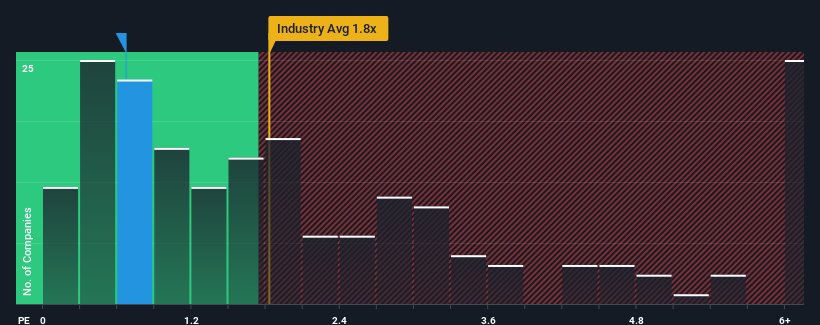- Hong Kong
- /
- Personal Products
- /
- SEHK:3332
Nanjing Sinolife United Company Limited's (HKG:3332) Popularity With Investors Is Under Threat From Overpricing

There wouldn't be many who think Nanjing Sinolife United Company Limited's (HKG:3332) price-to-sales (or "P/S") ratio of 0.7x is worth a mention when the median P/S for the Personal Products industry in Hong Kong is similar at about 0.8x. However, investors might be overlooking a clear opportunity or potential setback if there is no rational basis for the P/S.
View our latest analysis for Nanjing Sinolife United

How Has Nanjing Sinolife United Performed Recently?
With revenue growth that's exceedingly strong of late, Nanjing Sinolife United has been doing very well. The P/S is probably moderate because investors think this strong revenue growth might not be enough to outperform the broader industry in the near future. If that doesn't eventuate, then existing shareholders have reason to be feeling optimistic about the future direction of the share price.
Want the full picture on earnings, revenue and cash flow for the company? Then our free report on Nanjing Sinolife United will help you shine a light on its historical performance.Is There Some Revenue Growth Forecasted For Nanjing Sinolife United?
There's an inherent assumption that a company should be matching the industry for P/S ratios like Nanjing Sinolife United's to be considered reasonable.
Taking a look back first, we see that the company grew revenue by an impressive 48% last year. As a result, it also grew revenue by 22% in total over the last three years. So we can start by confirming that the company has actually done a good job of growing revenue over that time.
Comparing the recent medium-term revenue trends against the industry's one-year growth forecast of 9.6% shows it's noticeably less attractive.
With this information, we find it interesting that Nanjing Sinolife United is trading at a fairly similar P/S compared to the industry. Apparently many investors in the company are less bearish than recent times would indicate and aren't willing to let go of their stock right now. Maintaining these prices will be difficult to achieve as a continuation of recent revenue trends is likely to weigh down the shares eventually.
The Bottom Line On Nanjing Sinolife United's P/S
It's argued the price-to-sales ratio is an inferior measure of value within certain industries, but it can be a powerful business sentiment indicator.
Our examination of Nanjing Sinolife United revealed its poor three-year revenue trends aren't resulting in a lower P/S as per our expectations, given they look worse than current industry outlook. Right now we are uncomfortable with the P/S as this revenue performance isn't likely to support a more positive sentiment for long. Unless there is a significant improvement in the company's medium-term performance, it will be difficult to prevent the P/S ratio from declining to a more reasonable level.
You always need to take note of risks, for example - Nanjing Sinolife United has 2 warning signs we think you should be aware of.
If strong companies turning a profit tickle your fancy, then you'll want to check out this free list of interesting companies that trade on a low P/E (but have proven they can grow earnings).
Valuation is complex, but we're here to simplify it.
Discover if Nanjing Sinolife United might be undervalued or overvalued with our detailed analysis, featuring fair value estimates, potential risks, dividends, insider trades, and its financial condition.
Access Free AnalysisHave feedback on this article? Concerned about the content? Get in touch with us directly. Alternatively, email editorial-team (at) simplywallst.com.
This article by Simply Wall St is general in nature. We provide commentary based on historical data and analyst forecasts only using an unbiased methodology and our articles are not intended to be financial advice. It does not constitute a recommendation to buy or sell any stock, and does not take account of your objectives, or your financial situation. We aim to bring you long-term focused analysis driven by fundamental data. Note that our analysis may not factor in the latest price-sensitive company announcements or qualitative material. Simply Wall St has no position in any stocks mentioned.
About SEHK:3332
Nanjing Sinolife United
An investment holding company, engages in the manufacture and sale of nutritional supplements in the People’s Republic of China, Australia, New Zealand, and internationally.
Flawless balance sheet with solid track record.

